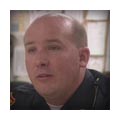|
INTERVIEWER
How much of your time as a police officer is now taken up with D.A.R.E.?
 BRETT RICHARDSON BRETT RICHARDSON
I'm a full-time D.A.R.E. instructor, so during the school year my sole
responsibility is being at one of my schools. I have five school--that means
I'm at one school every day of the week, 8-4. The chief that we have,
currently, is very supportive of the D.A.R.E. program, believes in it and that's
why we have three full-time instructors.
INTERVIEWER
How big is the force? How many officers do you have?
BRETT RICHARDSON
Thirty-five sworn officers and three of them are D.A.R.E. officers.
INTERVIEWER
Are all three of you full-time with D.A.R.E.?
BRETT RICHARDSON
Yes. Two of us do the elementary schools and then Leann does the two middle
schools and high school level.
INTERVIEWER
There are some people who would say that you sort of are
encouraging kids to spy on their family, parents. What's your answer to them?
BRETT RICHARDSON
No, we don't encourage the kids to spy. I don't care. I don't want to know.
If they don't want to tell me, I don't want to know. That's not my role. I'm
there as an instructor, not as an enforcement officer. I would just as soon
not know about who's doing the marijuana in the home. I'm there for the child.
I'm another resource.
I want to be a positive role model. I'm drug-free. I tell them that. I don't
use alcohol, I don't use tobacco, I don't use any illegal substance. Two weeks
ago, we did random drug testing at the police department, second time now my
name's come up. I walked in here at the police station, the chief walked past me
said, "Brett, go out to MedStat, your name came up." So I went out, did my
drug test. I tell the kids that was fine with me, I didn't have anything to
hide. I'm there as an instructor. I'm not there to gather information.
I don't encourage the kids to tell. It's by their choice if they want to come
to me and tell me, "Mom or dad's using drugs, what do I do?" or "I'm really
scared because my dad smokes." Those are the kind of issues we deal with.
 LEANN RICHARDSON LEANN RICHARDSON
I think that's a sore subject with us, especially with the D.A.R.E. program,
because we don't go in and teach these kids, "This is how to do surveillance on
your parents," or "This is what we want you to look for." It's not that type of a
curriculum. It's a prevention curriculum that we go in and we teach these kids
life skills, we teach them how to be safe, we teach them how to live a healthy
lifestyle, drug-free. And it has nothing in the curriculum about turning
people in or doing anything that way.
If a child, for some reason, feels uncomfortable about the home environment,
about something that's happening in their life, that's where we are and in our
relationship with them, as one more person for these kids to come over and talk
to, not as an undercover officer, or even as a police officer. We go in there
without a gun belt, as a human resource for these kids, as someone who really
cares about these kids.
INTERVIEWER
You're trying to create kind of non-drug culture to compete with the drug
culture.
BRETT RICHARDSON
We want to encourage them to not use drugs, because of the health effects, and
then the effects it has on society. Taxpayers are upset with all the taxes
we're paying. It doesn't make me happy as a taxpayer to hire more police
officers, build bigger jails, build more courts, hire more judges--that costs
me money. So if we can reduce overall criminality, not only drugs, but reduce
vandalism, reduce theft, shoplifting, all those issues, then we're helping
society. And as a police officer I see that as my role. I'm here to help people
and to reduce crime.
INTERVIEWER
But you're trying to paint a picture of marijuana that competes with another
picture that you'd be getting from peer pressure.
LEANN RICHARDSON
With marijuana, we want to teach them the facts. We want it to be their
decision, and their choice to never use. We believe if they know the facts
about drugs, whether it's marijuana, tobacco, alcohol, or any other drugs, if
they know the facts, they can make a logical choice for their own lives. And
that's what we're wanting to do.
INTERVIEWER
Do you think it's possible, though, to create a non-drug culture, especially with
something like marijuana. Do you think you can create a world where there's no
marijuana use?
LEANN RICHARDSON
The only way we're going to work on the war against drugs, or win the war on
drugs, is to reduce the demand. And we're trying to reduce the demand through
education, and that's why we got involved in the D.A.R.E. program. We wanted
to be a part of the kids' lives, to help them to make good choices and learn
how to resist peer pressure.
BRETT RICHARDSON
They warned me, when I went to the Illinois State Police Academy for my D.A.R.E.
training, that you're going to go into that classroom with the
belief that you'll save all those children. That all of your D.A.R.E. students
will always remain 100% drug-free, and for the first years that's the way I
felt. I wanted all of my students, every one of those children, to never use
drugs.
Nine years later, I'm a little more realistic in my thinking. But my desire is
still for every one of my D.A.R.E. students to be 100% drug-free. The reason I
feel that way is because I know what drugs do to the body. Through my
education of learning about the drugs, learning about marijuana, what effects
it has on the human body, what it's going to do to them, knowing that it burns
hotter than tobacco, knowing that it has all kinds of chemicals in it, the THC
level is higher now. Knowing all of that and then educating them of the
dangers of putting that into their bodies, and what the future could hold for
them then, having done that to themselves. Then I want them to make the
choice, but I want them to see through education.
INTERVIEWER
Do you ever feel like there is sort of two different sides of America with
regard to drugs?
BRETT RICHARDSON
Well, Warsaw is a really conservative community, so you're not going to
find many people willing to be outspoken in support of marijuana use in our
community. There are people out there, I'm sure, that would favor
legalization, and they use it everyday, and they say, "Look at me and I'm fine,"
and so on.
But being a conservative community as we are, you're not going to find them to
be outspoken, we don't go up against any adversaries publicly. We know it's
there when you have a sixth-grader come up to you and tell you that mom and dad
smoke it all the time. That's apparently acceptable in that family for those
parents. Yes, I'm sure we've got both sides, the mirror right
there, but hopefully we've got the kids seeing it from our side understanding
the dangers of that drug.
INTERVIEWER
What do you think of the sentencing for this kid's parents when they get
busted? Do you think that sentences for marijuana growing are adequate? Too
severe? Not severe enough?
BRETT RICHARDSON
I don't know that jail time is going to change anything in that person's life. I,
of course, do not put mom or dad smoking marijuana at the same level of someone
going out and killing somebody or raping someone. So the punishment shouldn't
be the same.
But then I've seen video tapes of police officers killed in the line of duty
because they stopped a car that has marijuana in it and the people don't want
to be arrested, I have mixed emotions about the punishment level. If you're
using marijuana, then you're supporting that behavior of people shooting cops.
So, my approach goes right along with the D.A.R.E.'s belief--we can attack
the demand side of it, reduce the demand. It's like any product--you make the
product and nobody wants to buy it, you're gonna quit trying to sell it. We do
have to punish people who break the law. There has to be some form of
punishment. If that means big fines and taking money out of their pocket, do
it that way. Some jail time, absolutely. They need to know there are going to
be consequences to their choice of using that drug. Lock them away for twenty
years? Probably not, but there should be some jail time and definitely some
fines.
INTERVIEWER
I've heard of people getting life sentences for growing.
LEANN RICHARDSON
Well, as far as what each person gets, it's going to be based on what they have
done in regards to marijuana, whether they've grown it or sold it or used it or
possessed it. It's illegal for anybody to be involved with marijuana in any
way. And as far as the fines or the amount of jail time each person gets,
it's going to vary with each separate case. I would hope that the judge
would do the right thing, but that's not up to us and we're pretty much law
enforcement so we can just do our job to try to get it off the street and
educate the kids and leave the other part up to the judges and the people that
are in the legislative branch of the government to make the laws that hopefully
are right.
INTERVIEWER
I'm sensing that you do have some questions about the degree of sentencing
sometimes.
BRETT RICHARDSON
As a police officer, we go out there and we enforce the law, we do the
paperwork, we take the time and then, to not see it follow through, then the
justice system becomes frustrating for a police officer.
We want punishment. As a police officer, and I think most police officers feel
this way or we wouldn't see police officers, we see there are reasons for laws
and why have laws if you break it there's no punishment? In fact, that's not
my area of expertise. I'm not in that part of it, I just cope with what the
judges and the juries and the attorneys work out.
|